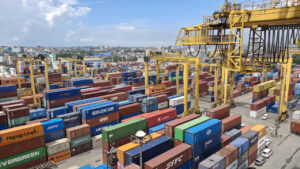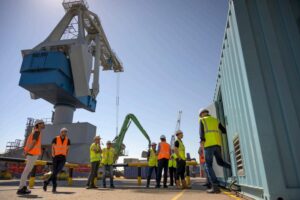Four companies have signed a memorandum of understanding for a joint feasibility study of large-scale carbon capture and storage (CCS) value chain project using ship transportation.
The firms are ITOCHU Corporation, Mitsubishi Heavy Industries (MHI), INPEX Corporation, and Taisei Corporation.
The group will jointly carry out a study relating to the separation, capture, ship transportation and storage of CO2 emitted from industries considered difficult to decarbonise.
They will also conduct a process of selecting prospective sites for CO2 storage in Japan.
Amid mounting global momentum towards decarbonisation, the Japanese Cabinet adopted the Sixth Strategic Energy Plan in October 2021.
This defined the CCS as a means that should be completely utilised in decarbonising hard-to-abate industries.
This also comes with a view towards two governmental targets of carbon neutrality in 2050 and a 46 per cent reduction in greenhouse gas emissions by fiscal year 2030.
READ: NYK launches Japan’s first ship-to-ship biofuel supply test
Japan’s Ministry of Economy, Trade and Industry, set a goal of launching a public offering of CCS value chain operators, including CO2 emitting companies, in 2024, and a number of advanced CCS projects by 2030.
ITOCHU joined the Geological Carbon Dioxide Storage Technology Research Association in June 2021.
This company aims to develop large-scale CO2 underground storage technologies for the development of sites suited for CO2 storage.
This latest feasibility study also comes not a year after ITOCHU Corporation partnered with MPA to establish an ammonia fuel supply.
ITOCHU additionally took part in the research, development and demonstration projects on CO2 Ship Transportation with a view of attaining wide-area ship transportation between CO2 emitters and sites appropriate for CO2 storage.
MHI has defined the Energy Transition as a growth area that should address strategically and position the building of a CO2 solutions ecosystem as one of the key initiatives in its 2021 Medium-Term Business Plan.
MHI has also positioned carbon dioxide capture, utilisation and storage (CCUS) as an effective means of creating a carbon-neutral society and has delivered CO2 capture plants to a total of 14 locations around the world.
READ: NYK and Shin-Nippon Kaiyosha start first Japanese 100 per cent biofuel supply trial
INPEX is working actively to change the energy structure for the purpose of creating a net zero carbon society by 2050 while meeting energy demand in Japan and elsewhere around the world. It set a target of achieving an annual CO2 injection volume of 2.5 million tons or more by around 2030.
TAISEI defines its pursuit towards reaching carbon neutrality by 2050 as a priority issue in its Medium-Term Business Plan and is making positive efforts for CCS.
With the use of the CO2 underground storage simulation technology that it has developed through major demonstration tests in Japan and overseas, it serves as a founding member of the Geological Carbon Dioxide Storage Technology Research Association.








